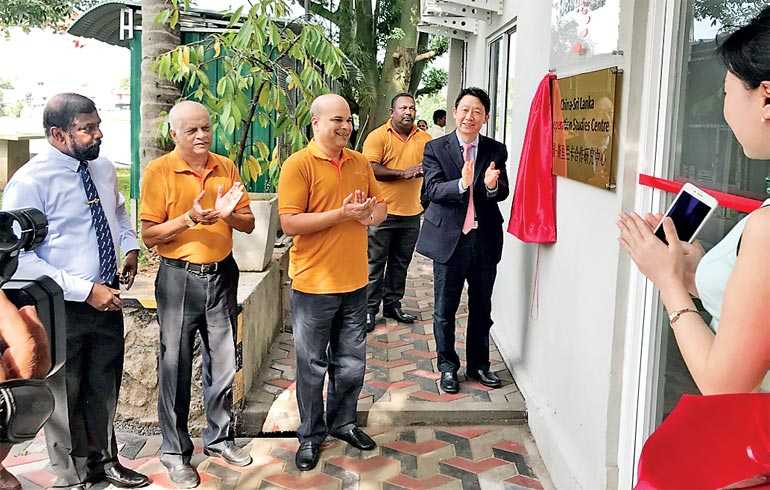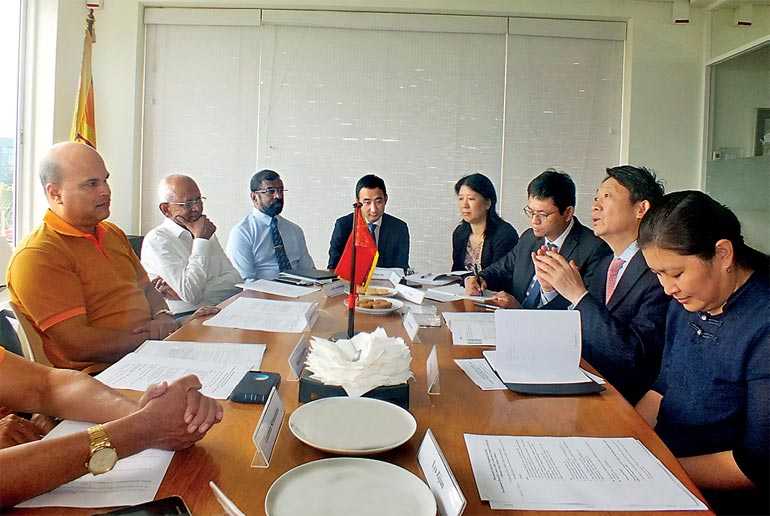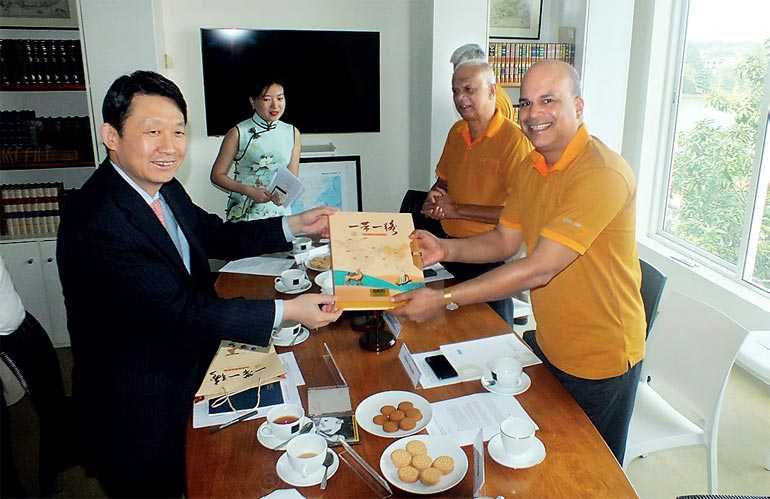Wednesday Feb 18, 2026
Wednesday Feb 18, 2026
Tuesday, 18 December 2018 01:19 - - {{hitsCtrl.values.hits}}



Vice President of the Development Research Center (DRC) of the State Council of the People’s Republic of China, Dr. Long Guoqiang, declared open the new office of Pathfinder Foundation’s ‘China-Sri Lanka Cooperation Studies Centre’ (CSLCSC) located at the ‘Riverpoint’ complex of the MMBL-Pathfinder group at Peliyagoda on Friday, 14 December.
The event was witnessed by a high-level delegation from the DRC and senior officials of the Embassy of China. The Chinese delegation was warmly welcomed by Milinda Moragoda, Pathfinder Founder and senior members.
Pathfinder Foundation, an advocacy and research think-tank functioning since 2006, has three centres focusing on China-Sri Lanka relations, India-Sri Lanka relations and Law of the Sea. While the China and the India centres focus on developing relations with those two countries, the Centre for Law of the Sea will give its attention to issues relating to the Bay of Bengal, the Indian Ocean and the ‘Blue Economy’.
The visiting delegation had substantive discussions with the Founder of PF and its senior staff members on the broader theme ‘Cooperation between China and Sri Lanka in developing production capacity within the framework of BRI’. Both sides exchanged views on promoting and facilitating Chinese investment, establishing and operating industrial parks and formulating policies for strengthening future bilateral cooperation.
DRC of the State Council is a policy research and consulting institution functioning directly under the central government of China. Its major function is to conduct advance research on overall comprehensive strategic and long-term issues in the field of economic and social development, as well as key issues relating to reforms and opening up, provide policy options and consulting advice to the Central Committee of CPC and the State Council.
During the discussion Founder Moragoda highlighted that PF had been in operation for over 10 years playing a catalytic role in advocating economic reforms, opening up of the economy and developing bilateral track II relations with countries such as China, India, the US, etc. and promoting dialogue and exchanges with several other countries including Singapore.
He also highlighted the important role that could be played by the CSLCSC for furthering bilateral relations for mutual benefit and the need to continue and strengthen its programs. He further explained the role played by the Centre for India-Sri Lanka Initiatives (CILI) and the Centre for Law of the Sea (CLOS) functioning under PF. Appreciating the steps taken to station Dr. Zhao Ying with CSLCSC, Moragoda underlined the important role played in that regard by the Embassy of China in Colombo and the South West University of Political Science and Law in Chongqing. He said a similar arrangement is being worked out with India to attach an Associate Director to CILI.
Speaking on the wide network of think-tanks and educational institutions with which PF has established formal and working relationships, Moragoda said that among such Chinese institutions with which PF is having regular interactions were the Chinese People’s Association of Peace and Disarmament (CPAPD), Boao Forum (BF), Shanghai Institutes for International Studies (SIIS), China Institutes of Contemporary International Relations (CICIR), China Center for Contemporary World Studies, Research Institute for Indian Ocean Economies of the Yunnan University of Finance and Economics (RIIO), South West University of Political Science and Law (SWUPSL), China Academy of West Region Development of Zhejiang University (CAWD) and China Center for South Asian Studies (CCSAS) of Sichuan University.
Founder Moragoda highlighted the need to learn from the Chinese experience in such areas as SOE restructuring, increasing efficiency of agriculture and the public service, and ways and means of developing industrial capacity for exports.
Dr. Long responded by explaining the structure of the DRC and establishment of the Centre for International Knowledge Development (CIKD) under its purview for sharing Chinese knowledge and experience in economic development.
The Centre has been established to promote global sustainable development through advance and sharing development knowledge. PF expressed its keen interest in establishing links with the DRC and CIKD with a view to disseminating Chinese knowhow and experience among Sri Lankan policymakers, academics, the business community and the public in general.
Vice President Long was accompanied by several delegates representing DRC. They included Zhang Qi – Vice Director-General, Research Department of Foreign Economic Relations; Wang Jinzhao – Vice Director-General, Research Department of Foreign Economic Relations; Lyu Zijian - Research Fellow, International Cooperation Department; Zhao Fujun - Researcher, Research Department of Foreign Economic Relations; and Gao Qingpeng - Researcher attached to the General Office of DRC. The Chinese Embassy was represented by the head of the political division, Counsellor Luo Chong.